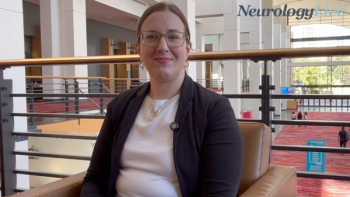
An investigator at Kuakini Health Systems spoke about the global importance of the Honolulu-Asia Aging Study, highlighting its history and findings, including data surrounding the diagnosis of neurodegenerative diseases. [WATCH TIME: 11 minutes]

An investigator at Kuakini Health Systems spoke about the global importance of the Honolulu-Asia Aging Study, highlighting its history and findings, including data surrounding the diagnosis of neurodegenerative diseases. [WATCH TIME: 11 minutes]

The associate professor of physical medicine and rehabilitation at Virginia Commonwealth University discussed his passion for educating others about electrodiagnosis and ultrasound in neuromuscular disorders.

The neuroscience program coordinator at Loyola University Medical Center talked about a recent global nurse survey for those caring for patients with generalized myasthenia gravis. [WATCH TIME: 5 minutes]

A phase 3 study evaluates remibrutinib's safety and efficacy for generalized myasthenia gravis, promising new treatment options for patients.

A phase 1/2 trial explores YTB323, a CAR T cell therapy, for treating generalized myasthenia gravis, aiming to enhance patient outcomes and safety.

A phase 3 study will evaluate iptacopan's efficacy in treating generalized myasthenia gravis, focusing on daily living activities and safety outcomes.

The associate professor of clinical neurology at Keck Medicine of USC discussed advancements in therapeutics, the growing focus on biomarkers, and ongoing challenges in myasthenia gravis. [WATCH TIME: 4 minutes]

The associate professor of neurology at Yale School of Medicine discussed 52-week data from the phase 3 MINT trial of inebilizumab in patients with generalized myasthenia gravis. [WATCH TIME: 5 minutes]

The head of Rare Diseases US at UCB talked about the company’s latest data on rozanolixizumab and zilucoplan in patients living with generalized myasthenia gravis. [WATCH TIME: 3 minutes]

The chief medical officer at Mandos Health discussed new CNS 2025 data on adrabetadex in infantile-onset Niemann-Pick type C and the growing evidence of its potential disease-modifying impact.

Test your neurology knowledge with NeurologyLive®'s weekly quiz series, featuring questions on a variety of clinical and historical neurology topics. This week's topic is on the 2025 AANEM Annual Meeting!

Mind Moments®, a podcast from NeurologyLive®, brings you an exclusive interview with Rebecca Edelmayer, PhD. [LISTEN TIME: 14 minutes]

A groundbreaking trial compares nipocalimab and efgartigimod for treating generalized myasthenia gravis, promising new insights for patient care.

A perspective model aimed noted that introducing efgartigimod alfa for patients with chronic inflammatory demyelinating polyneuropathy incurs more expected costs.

Patients with generalized myasthenia gravis reported a positive experience with rozanolixizumab self-administration, with a preference for the manual push method.

An open-label extension trial testing the efficacy of nipocalimab in patients transitioning from placebo revealed continued improvement in MG-Activities of Daily Living scores over a long-term period.

Data showed that efgartigimod led to greater improvements in disease activity compared with placebo in idiopathic inflammatory myopathy, and improvements in seronegative myasthenia gravis.

An analysis of the first 110 patients screened for the ARISE study showed that an independent adjudication committee confirmed the diagnosis of CIDP in nearly 3-quarters of cases.

A post-hoc analysis study revealed apomorphine sublingual film was efficacious over a long term period across various age ranges, including elders, with Parkinson disease.

Exenatide shows effects on brain metabolism in Parkinson disease but fails to provide clinical benefits, as recent trials reveal mixed results.

The professor of clinical neuroscience at Newcastle University discussed selecting appropriate and representative patient populations across different phases of clinical trials for Parkinson disease. [WATCH TIME: 5 minutes]

Riley Bove, MD, an associate professor of neurology at the University of California, San Francisco, discussed phase 4 findings from the MINORE and SOPRANINO studies that examined ocrelizumab exposure during pregnancy and lactation in women with MS.

Mark Forman, MD, PhD, chief medical officer at Ventyx Biosciences, discussed promising early-stage data of VTX3232, an NLRP3 inflammasome in development for early-stage Parkinson disease.

Experts shared their clinical perspectives on trending topics in the treatment and management of multiple sclerosis at the 54th Child Neurology Society (CNS) Annual Meeting, held October 8-11, 2025.

Neurology News Network for the week ending October 25, 2025. [WATCH TIME: 4 minutes]

At CNS 2025, the associate professor of neurology and pediatrics at the University of Virginia discussed using educational model frameworks to prepare child neurology trainees for clinical practice. [WATCH TIME: 3 minutes]

James N. Brenton, MD, director of the Pediatric MS and Related Disorders Clinic at the University of Virginia, discussed how lifestyle modification and multidisciplinary care can support disease management in children with multiple sclerosis.

At CNS 2025, the program director of child neurology residency at Boston Children's Hospital discussed strategies to expose medical students to child neurology early in their clinical training. [WATCH TIME: 4 minutes]

Experts shared their clinical perspectives on trending topics in the treatment and management of movement disorders at the 2025 International Congress of Parkinson’s Disease and Movement Disorders (MDS).

Clinical trial data presented at the 2025 International Congress of Parkinson’s Disease and Movement Disorders showed that pimavanserin had positive efficacy in patients showing Parkinson Disease psychosis symptoms who were treated earlier.